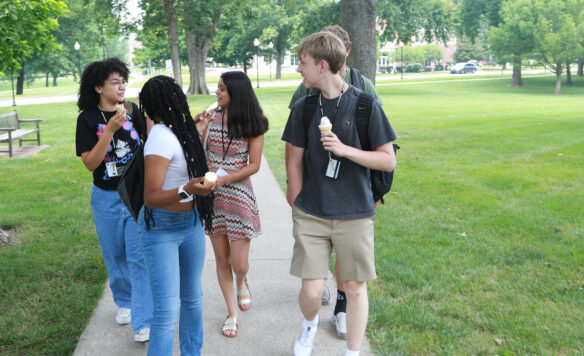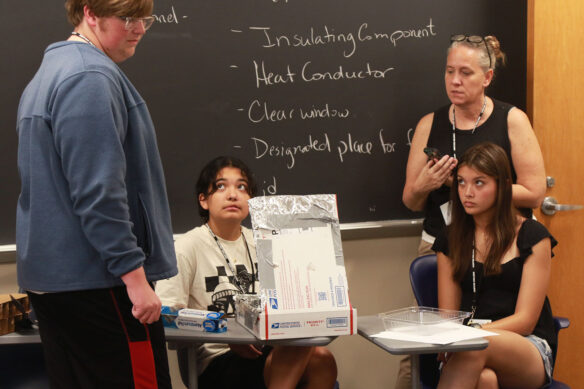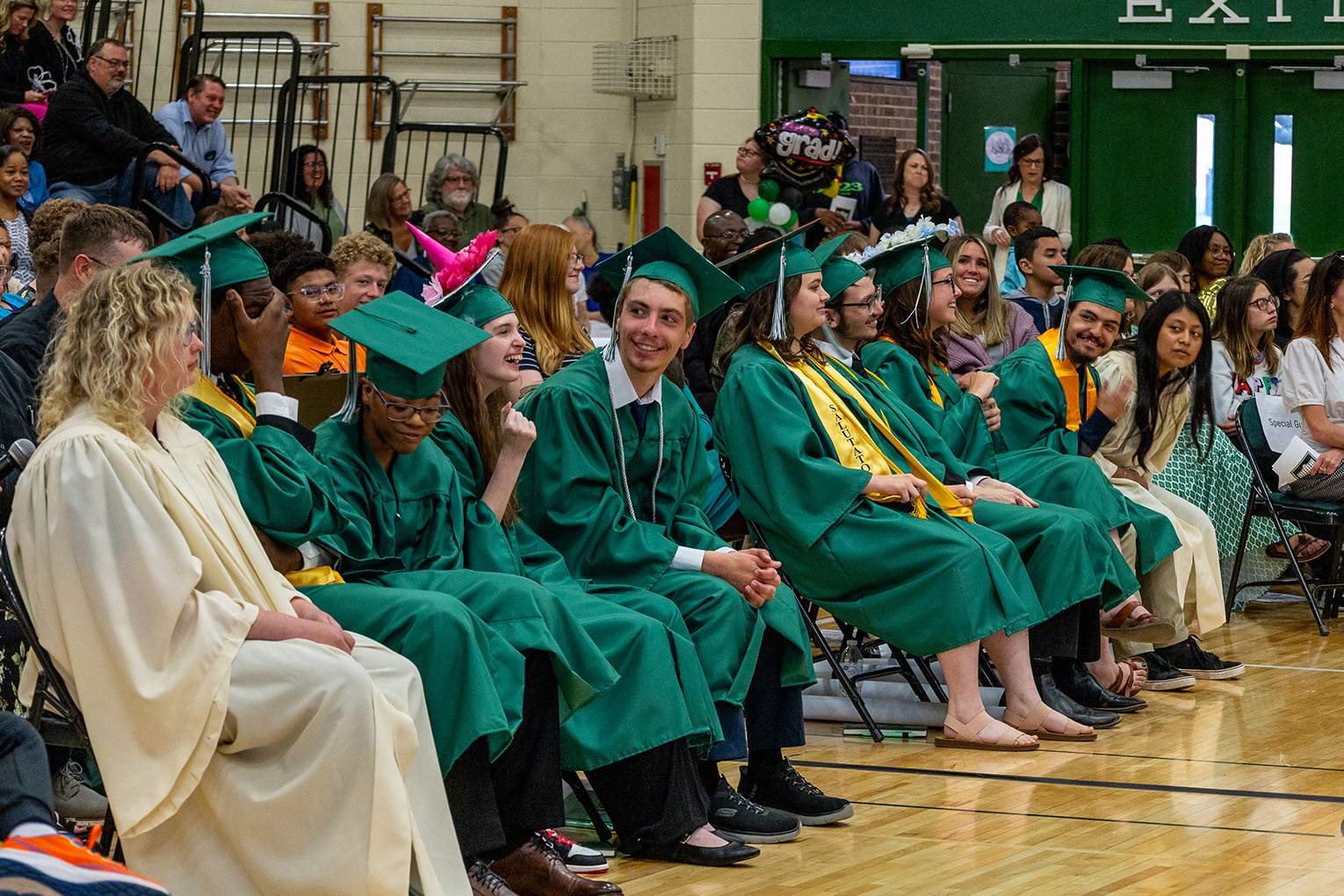
The Kentucky Governor’s Scholars Program – an intensive five-week, residential summer program – hosts 1,050 students on Bellarmine University, Centre College and Morehead State University campuses. In April 2021, the Kentucky Department of Education announced its plans to direct $75,000 per year for three years to expand the number of students served with federal Elementary and Secondary School Emergency Relief funding through the American Rescue Plan Act.. This year’s students at Centre include, from left, Janelle Pitmon, Kadi’ah Malone, Anya Sharma, Brayden Warren and Gillam Nicodemus.
Photo by Brennan Eberwine, Kentucky Department of Education
(DANVILLE, KY) – When students meet each other for the first time at the Kentucky Governor’s Scholars Program and ask where they’re from, they turn their hands sideways and curl in their thumb, creating a rough shape of the state.
“If you were from Centre College, you’d be in the middle,” explained Marshall County native Sarah Umbarger, pointing to her palm. “Or if you’re from Lexington, maybe a little over here, and it’s just where you are on the map, and it helps just like visualize like where people are at in Kentucky.”
The intensive five-week, residential summer program hosts 1,050 students on Centre College, Morehead State University and Murray State University campuses, where students learn about a subject they are interested in and gain skills to become future leaders for the Commonwealth. Of those students, 361 from 85 counties across Kentucky have converged on Centre College’s campus in Danville. It costs about $2,500 per scholar per year, but participants pay none of this cost.
In April 2021, the Kentucky Department of Education (KDE) announced its plans to direct $75,000 per year in 2021, 2022 and 2023 toward expanding GSP with federal Elementary and Secondary School Emergency Relief funding through the American Rescue Plan Act.
The additional funding provided by KDE has allowed GSP to focus on equity by opening spots for 30 more students and providing opportunities for students from historically underserved areas and backgrounds. Centre College’s campus director, Bryan Rich, was a Governor’s Scholar himself 26 years ago and has seen firsthand the impact on students.
“It has allowed these kids to enhance their leadership skills, to grow as an individual, to maybe start processing what their future looks like and how much Kentucky is part of that process,” Rich said. Staring at the posters lining his office with hundreds of past students in GSP, he said, “I know it’s a little hokey, but I often use the word and many of our graduates will use this word: It can be a life-changing experience.”
At its core, GSP is designed to create future leaders for Kentucky. By exposing students from different backgrounds and areas to each other – from Fulton County in far western Kentucky to Pike County all the way in the east – the next generation of leaders can better serve the Commonwealth.
“I’m going to always advocate for as many kids to have these experiences as possible,” Rich said. “Sometimes we don’t know what’s possible until we’re shown the opportunity, and just giving these kids an opportunity is just a tremendous honor.”

Physical science instructor Marie Price helps Governor’s Scholars Program students in making solar ovens that are able to cook food. Beyond just cooking franks, the students also were able to think about solutions to issues facing the environment, using the different perspectives they bring to the table.
Photo by Brennan Eberwine, Kentucky Department of Education
In one of the students’ general studies classes, groups observed the characteristics of a solar oven to create their own. Students from Elliott, Woodford, Kenton and Fayette counties all worked together to create ovens that could fully cook a hot dog, lest they end up with a raw piece of meat.
Beyond just cooking franks, the students also were able to think about solutions to issues facing the environment using the different perspectives they bring to the table.
“The issues you face, in environmental science especially, vary greatly whether you are in far Western Kentucky and a more rural area or Eastern Kentucky and a more mountainous area or if you’re living in Louisville,” said Marie Price, a physical science instructor at GSP.
Through their classes, Price says many students have learned how their decisions can impact other communities across the state, forcing them to think from a wider perspective.
Noon on Centre’s campus means students are released from their general studies classes and gather at Cowan Dining Commons, a buffet-style dining hall. They cluster together, with lively chatting within groups.
Five of these students sat at a long table, their plates filled with pasta and steamed vegetables, and talked about their experience in GSP for the first few weeks.
“It took me a while to adjust my sleep schedule, I was a walking zombie,” joked Kadi’ah Malone, a student at Central High School (Jefferson County). “But it was really fun meeting new people, and I’ve had so many conversations with people l have never even dreamed of. They live completely different lives than me.”
They discussed their passions and why they came to GSP, but also their fears of coming to an unfamiliar place with people from around the state. They very quickly found that they could often talk about anything.
Anya Sharma, a student in Louisville, never thought she would talk to a student in Owensboro, but she and Gilliam Nicodemus laughed about the same things over lunch.
“I talk to [Nicodemus] so many times a day, it’s not even funny. There’s so much common ground I never thought we would simply find,” said Sharma.
Because of this atmosphere of belonging, the students were comfortable talking about their fears about applying to GSP. Malone talked about why she almost didn’t come after an arduous application process.
“I came in with the mindset that there was going to be a lot of people who I just wouldn’t be able to connect with or a lot of people who grew up differently from the way I grew up, so maybe I wouldn’t be accepted,” said Malone. “Maybe I would be an outlier, maybe I’d be the only one.”
Malone talked about the hurdles students at Central High School in west Louisville often face in trying to apply to the program: a lack of help in applying and fear of being the odd one out because they’re students of color.
But what Malone ultimately found was a group of other ambitious and kind students willing to connect with her. An aspiring OB-GYN for underserved communities, Malone was able to connect with Sharma, whose father is a doctor.
Brayden Warren, a student from Clay County in Eastern Kentucky, felt the same way, although he thought it was intimidating to be around kids from Louisville who are more connected and have more resources.
“It’s not really that different place to place. There’s a lot more connections that are differences,” Warren said.
Janelle Pitmon, a student from Jefferson County, agreed. She worried about coming to GSP and being accepted as an LGBTQI+ student, but found the tension of trying to prove herself melted away.
“Because we’re all the same, we want to know about people’s differences, but because we’re all different, we learn from each other,” Pitmon said.




Leave A Comment